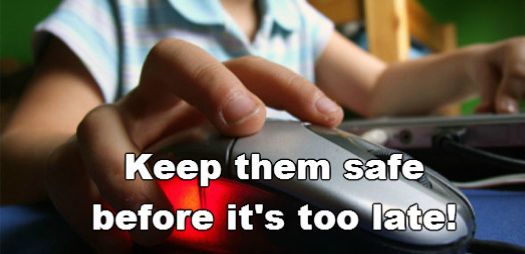While writing that headline I was wondering that I must’ve come across similar articles hundreds of times but never really clicked to see what it said. The reason? I was too confident that such thing cannot happen to my children as I am quite observant, available and vigilant when it comes to online activities but one workshop in my son’s school on” Cyber Security For Children” shocked me to the core and made me realise about the threats that can ruin my and my child’s life and how unprepared we all parents are.
When we were told about the data of children being abused, stalked, blackmailed, groomed online by not only predators but seemingly good enough other college goers, I felt knots in my stomach. Hearing about few cases where children as young as 12-13 committed suicide because they were victimised but afraid to speak to their parents about it, made me go speak to my son and tell him that no matter what happens and whoever is at fault, if something happens, he is coming and telling it to me first.
I know it might sound cynical but the thing that scared me the most was the new and creative ways in which these cyber criminals are operating and targeting our children. They are catching them young when they know children need a lot of ego stroking, attention and conformity and then using it to lure the child into whatever they want him/her to do. From kidnapping a Facebook crazy ever boasting teenager to threatening a young girl into sexting, these crimes are as new to the law enforcement agencies as they are to us. We all are learning because we did not have such challenges in our days, so we all have to learn, try and keep up with this tsunami of online world. Now the point comes that we all know there are dangers but what to do about it as lot of parents are not as technical as they would like to be, so I would say that it is not even a problem, put in some time and effort and just like bad internet, we do have safe internet practices which you need to make sure that your child follows. So here we go…
-
Educate yourself, be creative and use common sense
 Most of the problems, online or offline can be eradicated early on if we are a little observant and use some common sense. for instance keeping the computer in the living room, where it is easier for you to keep a vigil and your children would also be cautious that they can be caught if they are surfing or seeing something they are not supposed to. Also you can be his opponent in that online game he is very fond of, to keep track of his online friendships and other activities.
Most of the problems, online or offline can be eradicated early on if we are a little observant and use some common sense. for instance keeping the computer in the living room, where it is easier for you to keep a vigil and your children would also be cautious that they can be caught if they are surfing or seeing something they are not supposed to. Also you can be his opponent in that online game he is very fond of, to keep track of his online friendships and other activities.
-
No social networking below age 13
 13 seems to be like a magic age when it comes to online activities, the one big reason is that Facebook allows users only if they are over 13. Now we all know that there are lot of kids who already have an account and parents are too busy to notice or do anything about it and simply blame it on peer pressure. But we all need to know that there is a reason why it is kept at this age and we as parents should make sure that children follow the rules and if they do have to do something on social networking, you can offer your own account.
13 seems to be like a magic age when it comes to online activities, the one big reason is that Facebook allows users only if they are over 13. Now we all know that there are lot of kids who already have an account and parents are too busy to notice or do anything about it and simply blame it on peer pressure. But we all need to know that there is a reason why it is kept at this age and we as parents should make sure that children follow the rules and if they do have to do something on social networking, you can offer your own account.
-
Do they really need a Smartphone?
 It doesn’t mean that you have to ask them if they are ready for a Smartphone but being parents you would know if they are prepared to use the phone sensibly. Few tips, there should be no passwords on their phones, for younger children or below 13-14 years, give them a basic phone with no internet and make them play whatever they want to, on the desktop in the living room. Though applications like whatsapp and others can be used to help kids who are absent or need some information about the homework but they are mostly used for sharing pornographic or irrelevant material. And it might be easier said than done but Parents do need to make sure that their children are not indulging in this behaviour by either being a group member or by only giving your phone information for any or all online activities.
It doesn’t mean that you have to ask them if they are ready for a Smartphone but being parents you would know if they are prepared to use the phone sensibly. Few tips, there should be no passwords on their phones, for younger children or below 13-14 years, give them a basic phone with no internet and make them play whatever they want to, on the desktop in the living room. Though applications like whatsapp and others can be used to help kids who are absent or need some information about the homework but they are mostly used for sharing pornographic or irrelevant material. And it might be easier said than done but Parents do need to make sure that their children are not indulging in this behaviour by either being a group member or by only giving your phone information for any or all online activities.
-
Use parental or privacy controls
 If you are not a technical person, ask a friend, go online, buy antivirus and use filters to make sure that even by mistake kids are not landing on pages that can take them to porn sites and other similar webpages. Most torrent websites are flooded with these contents and it is advisable for the parents to make sure that they are not asking the child to download things on their own. You can also give them their own account on computer and decrease the amount of access or privileges based on their age. You can also use google safe search, buy Norton family security packs, netnanny and other similar technology to filter out the violent or explicit content. And if you do visit sites which are not healthy for children, then do remove history after every activity.
If you are not a technical person, ask a friend, go online, buy antivirus and use filters to make sure that even by mistake kids are not landing on pages that can take them to porn sites and other similar webpages. Most torrent websites are flooded with these contents and it is advisable for the parents to make sure that they are not asking the child to download things on their own. You can also give them their own account on computer and decrease the amount of access or privileges based on their age. You can also use google safe search, buy Norton family security packs, netnanny and other similar technology to filter out the violent or explicit content. And if you do visit sites which are not healthy for children, then do remove history after every activity.
-
Play by the rules and agree on boundaries
Do you know more than 90% boys below 16 see pornographic content online. I can’t push this point enough but age appropriate rules are important and very necessary to keep your kids safe. Set a routine, give them an hour or two of internet access, what websites they are allowed to go or if they can share their images on social media or not are some issues which the parents need to decide and then have discuss it with the children. Don’t try a blanket ban or things that might push them away from you, try to get him to agree on the rules. Also try and send him/her for outdoor activities and you can also complement these two, like for every hour played outside, they get additional 15 minutes online next day. Above all, set their expectations right and then play by the rules so they know what is expected of them .
-
Make yourself and your child aware of cyber crimes
 Remember when our parents used to tell us that talking to strangers is bad! A lot of us didn’t believe them but today things are scarier than ever, so it is imperative that you make your child know of all that is happening or can happen to children of his age. While children think they are chatting, posting, commenting anonymously, they need to know that digital footprints could live forever and then there are Cyber bullying, sexting, phishing attacks, personality thefts, sexual abuse, grooming pornography and hundred other things.So it is extremely important to discuss, share and talk about all this. Parents can try to attend workshops together or show children educational videos about the same from the link below.
Remember when our parents used to tell us that talking to strangers is bad! A lot of us didn’t believe them but today things are scarier than ever, so it is imperative that you make your child know of all that is happening or can happen to children of his age. While children think they are chatting, posting, commenting anonymously, they need to know that digital footprints could live forever and then there are Cyber bullying, sexting, phishing attacks, personality thefts, sexual abuse, grooming pornography and hundred other things.So it is extremely important to discuss, share and talk about all this. Parents can try to attend workshops together or show children educational videos about the same from the link below.
-
Communicate, talk, be a friend
 One thing we all ancient parents need to know is that no matter what you do, this is an information age and you cannot stop the abundance of knowledge and information or online engagement but what we can do effectively while we can is to communicate with our children, be a friend to them and tell them that no matter what mess they have gotten themselves into, we are always there before anybody else and they should never hesitate in sharing if they are being victimised of any online threat or abuse. We need to tell them what and not how! Children are curious, internet challenges them, indulges them, satisfies their curiosity like no one can so be with them on this journey where they can comfortably share everything they feel, do or want to do.
One thing we all ancient parents need to know is that no matter what you do, this is an information age and you cannot stop the abundance of knowledge and information or online engagement but what we can do effectively while we can is to communicate with our children, be a friend to them and tell them that no matter what mess they have gotten themselves into, we are always there before anybody else and they should never hesitate in sharing if they are being victimised of any online threat or abuse. We need to tell them what and not how! Children are curious, internet challenges them, indulges them, satisfies their curiosity like no one can so be with them on this journey where they can comfortably share everything they feel, do or want to do.
Age appropriate check list for parents:
Below 5
- It is never too early to start.
- Keep the home screen to a child friendly site.
- Use passwords for the phones and tabs.
- Check the age rating and stick to it.
- First play the game yourself, some cartoon you feel cute can be quite damaging.
6-10 years
- Use parental controls like filters, Google safe search etc.
- Educate children about the dangers of sharing personal information online.
- They should not be allowed to play too violent or aggressive games.
- Stick to the time limit given.
10-13 years
- Try to be a friend as this is the most impressionable age.
- Discuss boundaries and subsequent punishment beforehand.
- Discuss the permanency of digital footprints.
- Discuss what all they could see online and how you need to be informed if they stumble upon any such site.
- No social networking yet.
Over 13 years
- Reinforce boundaries
- Respect their privacy
- Teach them about the law and how one hurtful comment can be treated as illegal.
Here is a great resource which can also be used to start a communication with your children about being safe online.
http://www.nspcc.org.uk/help-and-advice/for-parents/online-safety/advice-for-parents/what-parents-need-know_wda99629.html
image courtesy: skiehman.blogspot.com
www.itv.com
www.otakuantics.com
You can help others by sharing this further by clicking the icons below:








Grt!! Very informative post Deepa thx a lot for sharing.
Good work deepa. Keep it up.